八年级下》Module 3 On the radio》全模块
文档属性
| 名称 | 八年级下》Module 3 On the radio》全模块 | 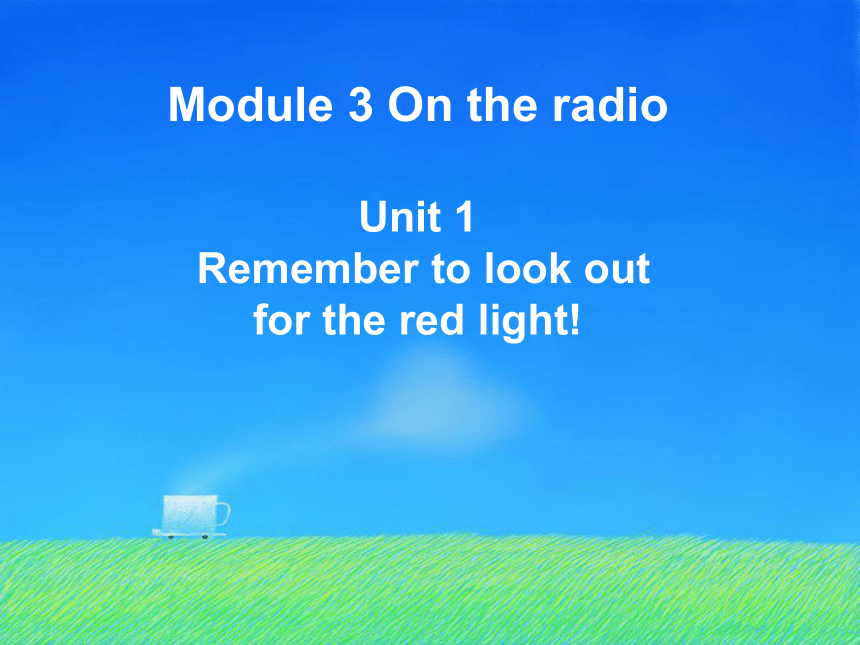 | |
| 格式 | rar | ||
| 文件大小 | 2.5MB | ||
| 资源类型 | 教案 | ||
| 版本资源 | 外研版 | ||
| 科目 | 英语 | ||
| 更新时间 | 2010-03-27 09:28:00 | ||
图片预览

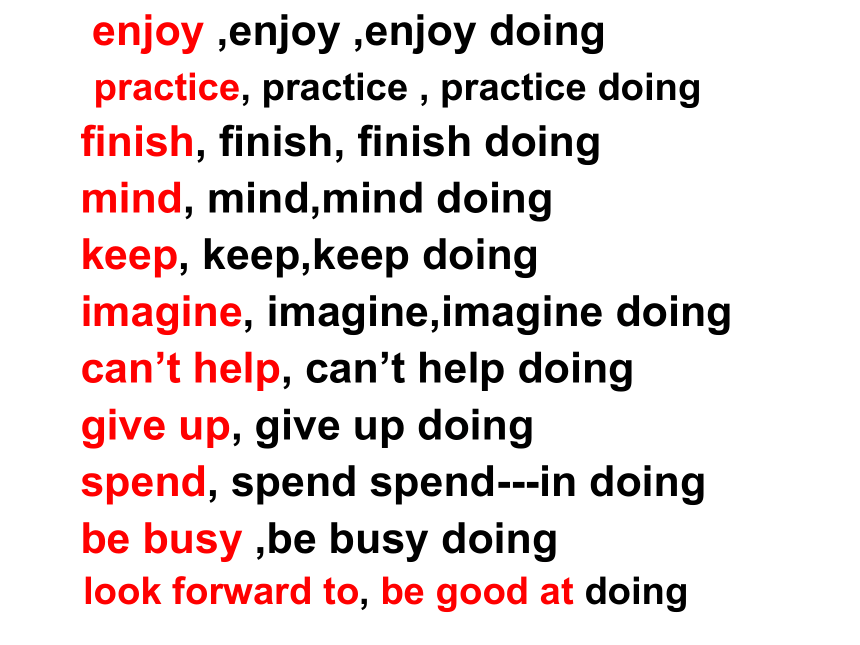
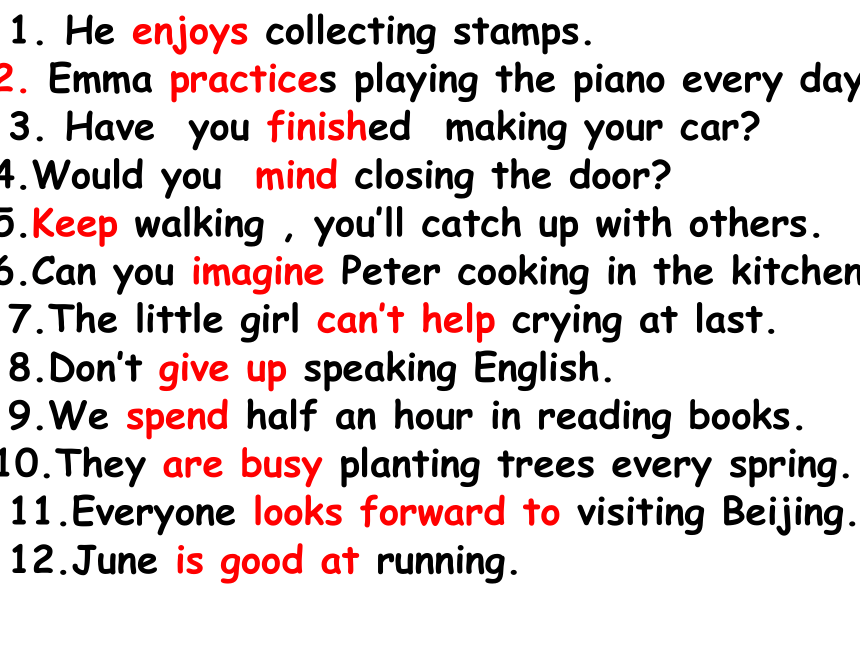
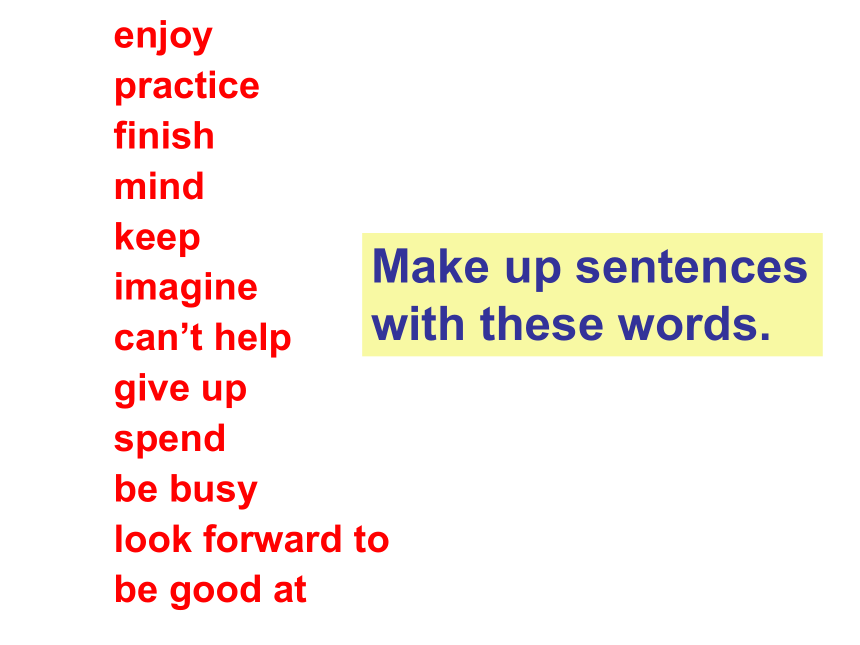
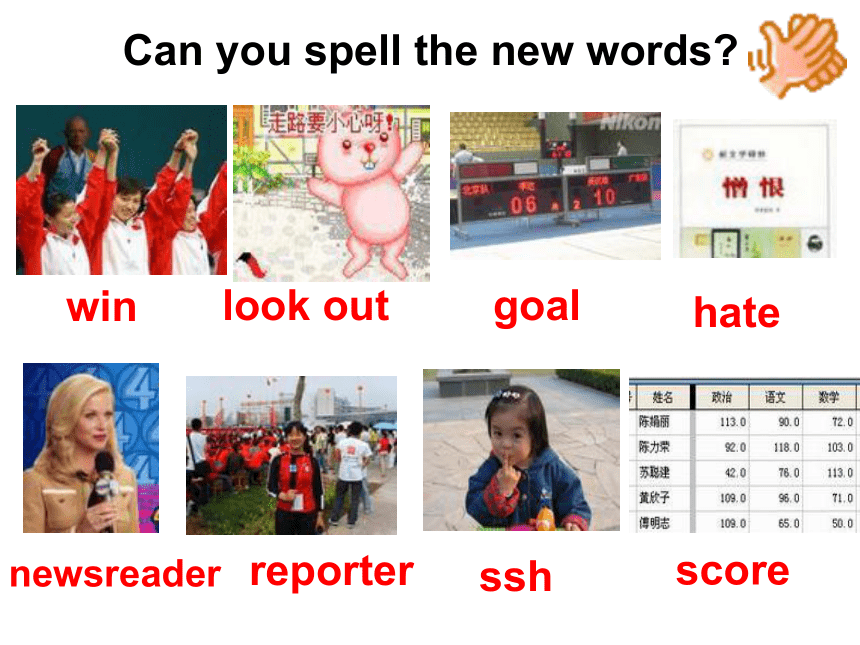
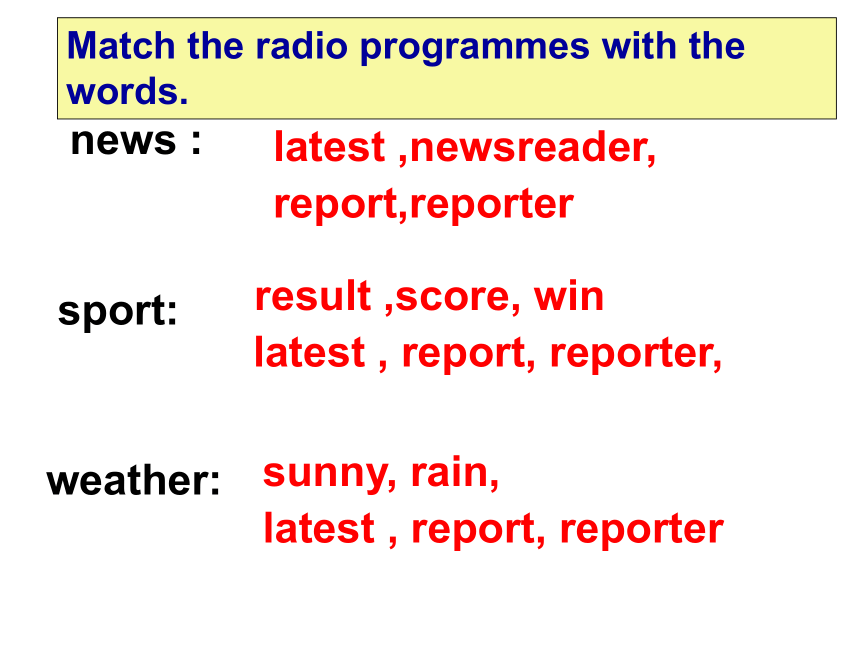
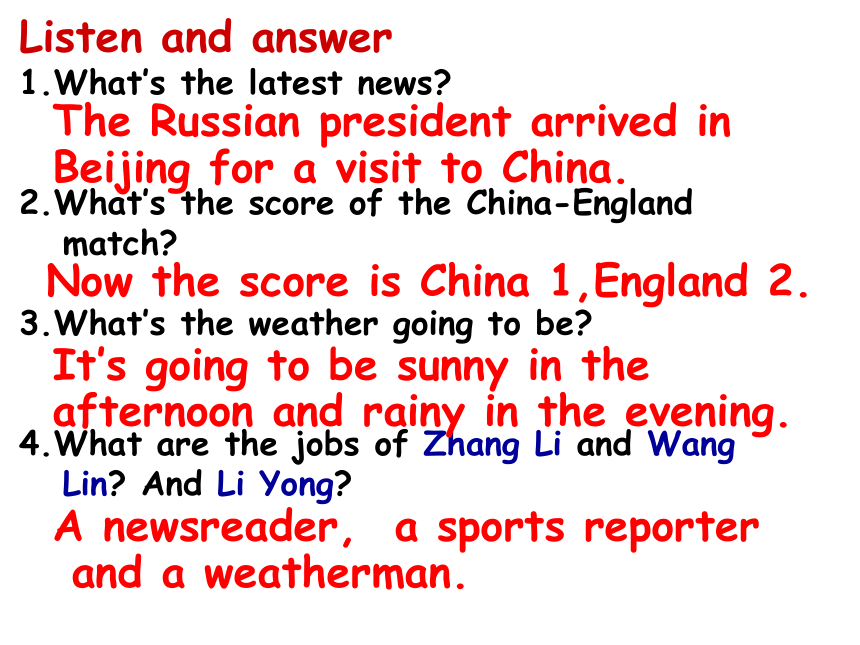
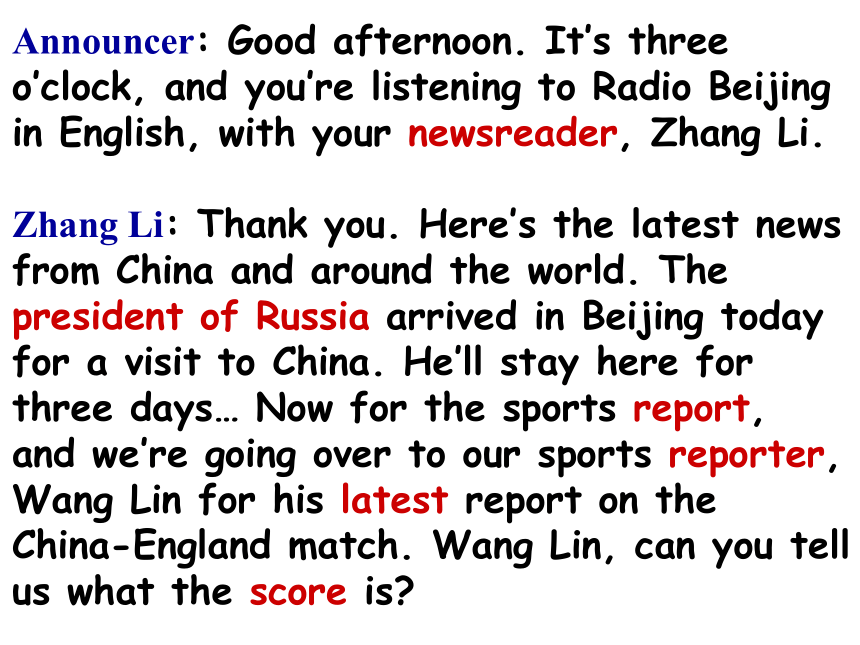
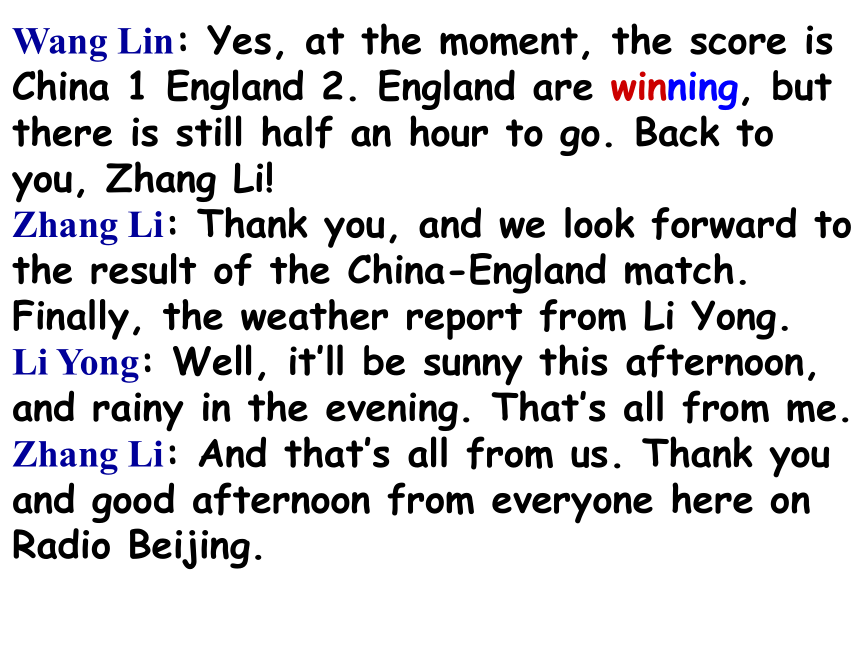
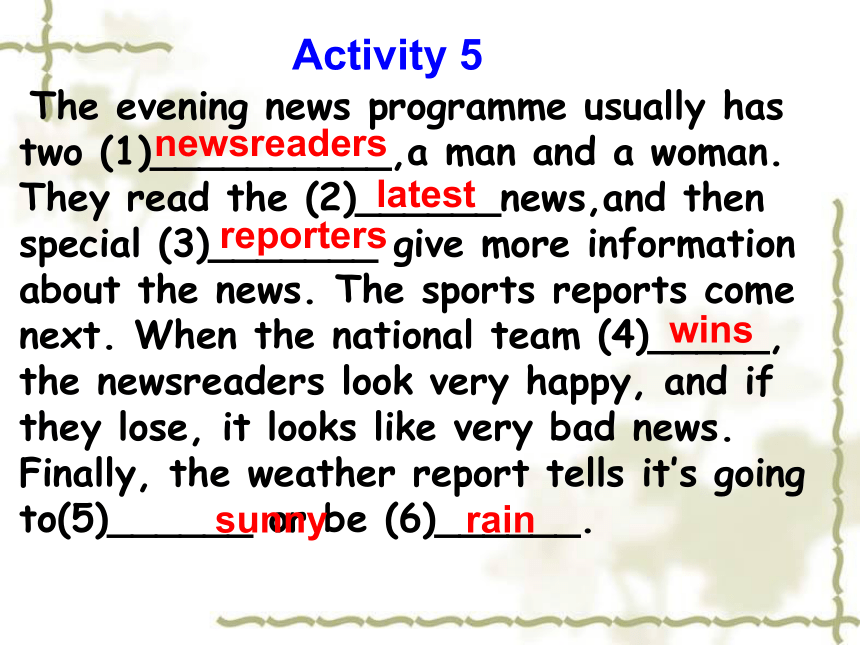


文档简介
课件62张PPT。Module 3 On the radio
Unit 1
Remember to look out
for the red light! enjoy ,enjoy ,enjoy doing
practice, practice , practice doing
finish, finish, finish doing
mind, mind,mind doing
keep, keep,keep doing
imagine, imagine,imagine doing
can’t help, can’t help doing
give up, give up doing
spend, spend spend---in doing
be busy ,be busy doing
look forward to, be good at doing
1. He enjoys collecting stamps.
2. Emma practices playing the piano every day.
3. Have you finished making your car?
4.Would you mind closing the door?
5.Keep walking , you’ll catch up with others.
6.Can you imagine Peter cooking in the kitchen?
7.The little girl can’t help crying at last.
8.Don’t give up speaking English.
9.We spend half an hour in reading books.
10.They are busy planting trees every spring.
11.Everyone looks forward to visiting Beijing.
12.June is good at running.enjoy
practice
finish
mind
keep
imagine
can’t help
give up
spend
be busy
look forward to
be good atMake up sentences with these words.Can you spell the new words?winlook outgoalhatenewsreaderreportersshscore news :
sport:
weather:
Match the radio programmes with the words. latest ,newsreader,
report,reporter
result ,score, win
latest , report, reporter,sunny, rain,
latest , report, reporter
Listen and answer
What’s the latest news?
What’s the score of the China-England
match?
3.What’s the weather going to be?
4.What are the jobs of Zhang Li and Wang
Lin? And Li Yong?The Russian president arrived in Beijing for a visit to China.Now the score is China 1,England 2. It’s going to be sunny in the afternoon and rainy in the evening. A newsreader, a sports reporter
and a weatherman. Announcer: Good afternoon. It’s three
o’clock, and you’re listening to Radio Beijing
in English, with your newsreader, Zhang Li.
Zhang Li: Thank you. Here’s the latest news
from China and around the world. The
president of Russia arrived in Beijing today
for a visit to China. He’ll stay here for
three days… Now for the sports report,
and we’re going over to our sports reporter,
Wang Lin for his latest report on the
China-England match. Wang Lin, can you tell
us what the score is? Wang Lin: Yes, at the moment, the score is
China 1 England 2. England are winning, but
there is still half an hour to go. Back to
you, Zhang Li!
Zhang Li: Thank you, and we look forward to
the result of the China-England match.
Finally, the weather report from Li Yong.
Li Yong: Well, it’ll be sunny this afternoon,
and rainy in the evening. That’s all from me.
Zhang Li: And that’s all from us. Thank you
and good afternoon from everyone here on
Radio Beijing. Activity 5
The evening news programme usually has two (1)__________,a man and a woman.
They read the (2)______news,and then special (3)_______ give more information about the news. The sports reports come next. When the national team (4)_____,
the newsreaders look very happy, and if they lose, it looks like very bad news. Finally, the weather report tells it’s going to(5)______ or be (6)______.newsreaderslatestreporterswinssunnyrain4 Answer the questions:
How does Chen Huan feel about taking them around?
Why don’t Daming and Tony agree with each other about the result?
3. How do you think the friends feel about visiting Radio Beijing?He enjoys showing visitors around.Because Daming is Chinese and he’s glad
China won and Tony is English, he’s sad
that England lost.I think they feel very excited. Everyday English
Don’t mention it.
Come this way.
Keep studying!
Me, too!
Quiet, please!别客气。这边走。不断学习。我也是。请安静! 1. You’re welcome.
2. show sb around
3. pay attention to…
4. Follow me.
5. sometime in the future
6. be a member of us
7. get ready for
8. strongly dislikeCan you find out the phrases? Don’t mention it.
take sb around
look out for…
Come this way.
one day
join us
prepare
hate因…而感谢你
领某人四处参观
不客气
小心红灯
这边走。
新闻演播室
收集最新消息
撰写报道
继续学习
有朝一日
加入我们
决定听什么 thank you for doing sth
take/show sb around
Don’t mention it.
look out for the red light
Come this way.
the news room
collect the latest news
write the reports
keep studying
one day
join us
decide what to listen to
在那边
体育新闻/记者
准备气象预报
进两球
中英比赛得分
赢得/输了比赛
讨厌输球
…的结束
晚间新闻节目
国家队
上一次
打开收音机
从事播音工作 over there
sports news/sports reporter
prepare the weather report
score two goals
the score of the China-England match
win/lose the match (won)(lost)
hate losing
the end of …
the evening news programme
the national team
the last time
turn on the radio
work on radioModule 3 On the radio
Unit 2
I remember sitting close to the radio Yesterday Once More
When I was young,
I’d listen to the radio,
Waiting for my favourite songs.
When they played,
I’d sing along,
It made me smile.
… …Discuss
1. What do you like listening to ?
2. What do you hate listening to?
What programme did you listen to the
last time you turned on the radio?
What do you need to do if you want
to be a newsreader?
5. What must you keep doing to work on
radio?
6. Do you or your parents decide what
to listen to and when to listen to the
radio?
Can you spell the new words? look downCan you spell the new words? listenerCan you spell the new words? explain weeklyCan you spell the new words?Voice of AmericaCan you spell the new words? article microphoneCan you spell the new words? glass a wall Can you spell the new words? checklook downlistenerexplainweeklyvoicearticlemicrophoneglasscheckDecide where you’re likely to read the passage.In a book about the history of radio.
In the life story of a famous radio presenter.
In a book on how radio works.Read the passage and say true or false A radio manager interviewed the writer.
The writer liked to listen to the radio when he was three.
When the writer grew older, he lost his interest in radio.
The writer started making radio programmes with his friends at junior high school.
The writer began his work in radio when he was fifteen.TFFFTRead the passage and answer the questions:Who wrote it?
What is the story about?
Why did he write it?A presenter. / A person working on radio for some time.It’s about an interview at a radio station.Because he wanted to tell people how he got interested in radio work.Language points:1. Shouldn’t you be at school?
这是一个否定问句,带有惊讶情绪,这种问句还可以表示责难和赞赏, 如:
--Why are you driving so fast? Don’t you know the traffic regulations?
--Aren’t these flowers beautiful?It seemed that they were speaking to me in person.解析:
⑴ It seemed that…
表示“看起来似乎…”的意思, 如:
It seemed that he had no money with him.
⑵ in person “亲自” , 如:
He went to Beijing to receive the award in person.Questions1.Where did the writer listen to the radio?2.What did he listen to?3.How did he feel when he listened to the radio?4.Did he ask for a job in small radio stations?
When?He listened to the radio in the living room,
and sat close to the radio.He listened to his favourite programme
and the voices of his favourite presenters. It seemed that they were speaking
to him in person. Yes.At the age of nine. I have always _______ the radio. When I
was 4 or 5 , I remembered ______________
the radio, ___________ my favourite programmes, and the _______of my favourite _________. It _________ that they were
speaking to me ___________.
______________ nine, I ____________ jobs
in small _____________.
lovedlistening tovoices presenters seemed in personAt the age of asked for radio stationssitting close to have always loved
4 or 5 ... sitting close to… listening to…
It seemed that … in person
nine… asked for …. Once a week, I played my favourite music from my father’s computer to the listeners, talked about life at school, and then closed down and did my homework 解析:
⑴Once a week “一周一次”,先说次数,再说一周,如:
Once a week, I go to the cinema with my father.
⑵ close down “关闭,停止”的意思, 如:
The small shop on the corner has closed down.5.What did he learn about one day?6.What did he do then?One day he learnt about Internet radio. He played his favourite music from his
father’s computer to the listeners, talked
about life at school, and then closed down.He did it once a week.7.How often did he do it? …grew older … grew
learnt about…
played …from…to….
talked about….
closed down and did…8.What did his friends do soon? And then?9.What did they do together?They started to listen, and then
they wanted to help.They prepared the weekly programmes,
articles about music, sports news, jokes
and the weather report. 10.How did the writer prepare the weather
report?He did this by looking out of the window. Soon …started to …wanted to…
prepared the weekly programmes,
……
(did it by…)Answer the questions about the words and expressions in the box.Why does the writer ask “How could I explain?”
Did the writer write all the articles on his home page in person or did someone help him?
How did the writer prepare programmes about the weather?article explain in person prepare Because it’s hard for him to explain his love for radio.Some of his friends helped him. By looking out of the window to see what it was like.Unit 3 List as many words as you can:decide learn need want …keep …hate
like love remember start stop try …Complete the sentences with the correct form of the words:Tony hates _________ (see) his team lose.
Daming enjoys__________( listen) to music.
They decided ________ (visit) Radio Beijing.
They have to stop _______ (talk) when the red light is on.
Keep _________ ( study) English if you want to work on Radio Beijing.
You need _______( speak) English to work in radio.
He started ___________ (make) his own programme.
He learnt _________ (speak) on the radio.seeinglisteningto visit talkingstudyingto speakto make/makingto speak How do I get the first job?
(Give us some events.)The manager asked me how old I was and
if I wanted a job in radio.
Then he took me to a studio. I sat in front of a microphone. He sat in another room, behind the glass wall.
He told me to do a sound check.
And I passed.
This was how my first real job in radio began.Around the world: The Clockwork RadioTrevor Baylis
realised how much a radio would help
electricity and batteries, expensive
A clock , without electricity and batteries
first made in South Africa in 1994Module task: Making a school radio programmeDecide what to include in
your school radio show.
News
Sports and sports news
Music
StoriesReviews
Interviews
Phone-ins
Weather reports
Decide who will write and present
each section and write.4 Fill in the blanks with “to+v”或“v+ing”.I want our team ______(win). I like ______ (win).
You need _____(speak) English to work in radio.
He learnt __________(speak)on the radio.
They have to stop ______(talk) when the red light is on. to win winning to speak speaking talkingStep6: Exercise 我们决定留下来喝杯茶。
___________________________________
我努力理解这些话。
_____________________
我不喜欢写天气。
___________________________________
我喜欢踢足球。
___________________________________We decide to stay for a cup of tea.I try to understand these words.I don’t like writing weather.I like playing football.跟动词不定式作宾语的动词有:1.want to do sth.
2.would like to do sth.
3.hope to do sth. 希望自己做某事(
4.wish to do sth.
5.plan to do sth.
6.need to do sth.
7.decide to do sth.
8.forget to do sth. 忘记做某事(尚未做)
9.remember to do sth. 记着去做某事(尚未
10.try to do sth.
11.agree to do sth. .同意做某事 必须跟v.-ing形式作宾语做宾语的情况: enjoy doing sth. 喜欢做某事 例如:
He enjoys watching TV.
2. finish doing sth. 完成做某事 例如:
He finished cleaning the floor.
3. practise doing sth. 练习做某事 例如:
He practise singing the song.
4. keep doing sth. 一直做某事 例如:
He keeps writing the story .
5. give up doing sth. 放弃做某事 例如:
He gave up smoking.
6.stop doing停止做某事 例如:
He stopped watching TV.既可以跟动词不定式又可以跟v.-ing形式做宾语的词, 有时候要注意它的意义的区别:1.stop to do sth. 停下来去做某事
stop doing sth.停下来不做某事 例如:
I suggest we stop working and have a rest.
They stopped to listen, but there was no more sound.
2.see sb. do sth.看见某人做某事全过程
see doing sth.看见某人正在做某事 例如:
I saw the leaves falling.
I saw the boy fall off the tree.
3.hear sb. do sth. 听见某人做某事全过程 例如:
hear doing sth.听见某人正在做某事
I hear him cry in the next room.
I hear him singing in the next room.4.forget to do sth. 忘了去做某事 例如:
forget doing sth.做过某事而忘了
Don't forget to give my regards to them.
I forgot closing the door.
5.remember to do记得去做某事
remember doing sth.记得做过某事 例如:
I remember doing this exercise before.
Remember to post the book for me.
6.like to do sth.喜欢去做某事例如:
like doing sth.平时喜欢做某事
She likes doing housework.
Do you like to eat ice-cream?
7 .try to do sth.努力做某事 例如:
try doing sth.试着做某事
I'll try to improve my pronunciation.
Why not try knocking at the back door?意思区别不大的词 :1.begin to do /doing sth.开始做某事
I began to understand my mother's feelings.
2.start to do/ doing sth. 开始做某事
It started to rain.
3.continue to do / doing sth.继续做某事
He continues to clean the floor.
4. hate to do /doing sth. 憎恨做某事 例如:
I hate watching sports.3 Explain the grammar 在本模块中,我们主要介绍一下to+v与v+ing形式作动词宾语的情况,请看下列例句:want to write
decide to start an English student newspaper
love watching sports
enjoy playing football
hate writing about the weather
1. would like to do想做某事
2. thank you for doing sth.多谢某人做某事
3. take/show sb around sw.带某人参观某地
4. Don’t mention it.别客气
5. enjoy doing sth 喜欢做某事
6. look out for小心,注意
7. stop doing sth停止做某事
8. come this way这边走
9. keep doing sth不断做某事
10. Let’s do sth让我们做某事
11. score…goal 进了。。。。几球
12. hate doing sth讨厌做某事
13. start doing sth开始做某事一般来说,不定式表示将来的动作或行为,而v+ing形式表示经常性的、一般性的动作或行为及正在进行的动作或行为。
意思完全不同如:
stop to do sth
stop doing sth
forget to do sth
forget doing sth
remember to do sth
remember doing sth 总结规律:want to write
decide to start an English student newspaper
love watching sports
enjoy playing foofball
hate writing about the weatherto+v与v+ing形式作动词宾语 总结规律:一般来说,不定式表示将来的动作或行为,而v+ing形式表示经常性的、一般性的动作或行为及正在进行的动作或行为。write a short passage about an imaginary job experience. Think of sth. You love doing.
Imagine you have had a job doing it.
Describe an important event in the past
and some background information.
Eg.
I first appeared on TV at the age of sixteen.
A television presenter stopped me in the
street and started to interview me…
Unit 1
Remember to look out
for the red light! enjoy ,enjoy ,enjoy doing
practice, practice , practice doing
finish, finish, finish doing
mind, mind,mind doing
keep, keep,keep doing
imagine, imagine,imagine doing
can’t help, can’t help doing
give up, give up doing
spend, spend spend---in doing
be busy ,be busy doing
look forward to, be good at doing
1. He enjoys collecting stamps.
2. Emma practices playing the piano every day.
3. Have you finished making your car?
4.Would you mind closing the door?
5.Keep walking , you’ll catch up with others.
6.Can you imagine Peter cooking in the kitchen?
7.The little girl can’t help crying at last.
8.Don’t give up speaking English.
9.We spend half an hour in reading books.
10.They are busy planting trees every spring.
11.Everyone looks forward to visiting Beijing.
12.June is good at running.enjoy
practice
finish
mind
keep
imagine
can’t help
give up
spend
be busy
look forward to
be good atMake up sentences with these words.Can you spell the new words?winlook outgoalhatenewsreaderreportersshscore news :
sport:
weather:
Match the radio programmes with the words. latest ,newsreader,
report,reporter
result ,score, win
latest , report, reporter,sunny, rain,
latest , report, reporter
Listen and answer
What’s the latest news?
What’s the score of the China-England
match?
3.What’s the weather going to be?
4.What are the jobs of Zhang Li and Wang
Lin? And Li Yong?The Russian president arrived in Beijing for a visit to China.Now the score is China 1,England 2. It’s going to be sunny in the afternoon and rainy in the evening. A newsreader, a sports reporter
and a weatherman. Announcer: Good afternoon. It’s three
o’clock, and you’re listening to Radio Beijing
in English, with your newsreader, Zhang Li.
Zhang Li: Thank you. Here’s the latest news
from China and around the world. The
president of Russia arrived in Beijing today
for a visit to China. He’ll stay here for
three days… Now for the sports report,
and we’re going over to our sports reporter,
Wang Lin for his latest report on the
China-England match. Wang Lin, can you tell
us what the score is? Wang Lin: Yes, at the moment, the score is
China 1 England 2. England are winning, but
there is still half an hour to go. Back to
you, Zhang Li!
Zhang Li: Thank you, and we look forward to
the result of the China-England match.
Finally, the weather report from Li Yong.
Li Yong: Well, it’ll be sunny this afternoon,
and rainy in the evening. That’s all from me.
Zhang Li: And that’s all from us. Thank you
and good afternoon from everyone here on
Radio Beijing. Activity 5
The evening news programme usually has two (1)__________,a man and a woman.
They read the (2)______news,and then special (3)_______ give more information about the news. The sports reports come next. When the national team (4)_____,
the newsreaders look very happy, and if they lose, it looks like very bad news. Finally, the weather report tells it’s going to(5)______ or be (6)______.newsreaderslatestreporterswinssunnyrain4 Answer the questions:
How does Chen Huan feel about taking them around?
Why don’t Daming and Tony agree with each other about the result?
3. How do you think the friends feel about visiting Radio Beijing?He enjoys showing visitors around.Because Daming is Chinese and he’s glad
China won and Tony is English, he’s sad
that England lost.I think they feel very excited. Everyday English
Don’t mention it.
Come this way.
Keep studying!
Me, too!
Quiet, please!别客气。这边走。不断学习。我也是。请安静! 1. You’re welcome.
2. show sb around
3. pay attention to…
4. Follow me.
5. sometime in the future
6. be a member of us
7. get ready for
8. strongly dislikeCan you find out the phrases? Don’t mention it.
take sb around
look out for…
Come this way.
one day
join us
prepare
hate因…而感谢你
领某人四处参观
不客气
小心红灯
这边走。
新闻演播室
收集最新消息
撰写报道
继续学习
有朝一日
加入我们
决定听什么 thank you for doing sth
take/show sb around
Don’t mention it.
look out for the red light
Come this way.
the news room
collect the latest news
write the reports
keep studying
one day
join us
decide what to listen to
在那边
体育新闻/记者
准备气象预报
进两球
中英比赛得分
赢得/输了比赛
讨厌输球
…的结束
晚间新闻节目
国家队
上一次
打开收音机
从事播音工作 over there
sports news/sports reporter
prepare the weather report
score two goals
the score of the China-England match
win/lose the match (won)(lost)
hate losing
the end of …
the evening news programme
the national team
the last time
turn on the radio
work on radioModule 3 On the radio
Unit 2
I remember sitting close to the radio Yesterday Once More
When I was young,
I’d listen to the radio,
Waiting for my favourite songs.
When they played,
I’d sing along,
It made me smile.
… …Discuss
1. What do you like listening to ?
2. What do you hate listening to?
What programme did you listen to the
last time you turned on the radio?
What do you need to do if you want
to be a newsreader?
5. What must you keep doing to work on
radio?
6. Do you or your parents decide what
to listen to and when to listen to the
radio?
Can you spell the new words? look downCan you spell the new words? listenerCan you spell the new words? explain weeklyCan you spell the new words?Voice of AmericaCan you spell the new words? article microphoneCan you spell the new words? glass a wall Can you spell the new words? checklook downlistenerexplainweeklyvoicearticlemicrophoneglasscheckDecide where you’re likely to read the passage.In a book about the history of radio.
In the life story of a famous radio presenter.
In a book on how radio works.Read the passage and say true or false A radio manager interviewed the writer.
The writer liked to listen to the radio when he was three.
When the writer grew older, he lost his interest in radio.
The writer started making radio programmes with his friends at junior high school.
The writer began his work in radio when he was fifteen.TFFFTRead the passage and answer the questions:Who wrote it?
What is the story about?
Why did he write it?A presenter. / A person working on radio for some time.It’s about an interview at a radio station.Because he wanted to tell people how he got interested in radio work.Language points:1. Shouldn’t you be at school?
这是一个否定问句,带有惊讶情绪,这种问句还可以表示责难和赞赏, 如:
--Why are you driving so fast? Don’t you know the traffic regulations?
--Aren’t these flowers beautiful?It seemed that they were speaking to me in person.解析:
⑴ It seemed that…
表示“看起来似乎…”的意思, 如:
It seemed that he had no money with him.
⑵ in person “亲自” , 如:
He went to Beijing to receive the award in person.Questions1.Where did the writer listen to the radio?2.What did he listen to?3.How did he feel when he listened to the radio?4.Did he ask for a job in small radio stations?
When?He listened to the radio in the living room,
and sat close to the radio.He listened to his favourite programme
and the voices of his favourite presenters. It seemed that they were speaking
to him in person. Yes.At the age of nine. I have always _______ the radio. When I
was 4 or 5 , I remembered ______________
the radio, ___________ my favourite programmes, and the _______of my favourite _________. It _________ that they were
speaking to me ___________.
______________ nine, I ____________ jobs
in small _____________.
lovedlistening tovoices presenters seemed in personAt the age of asked for radio stationssitting close to have always loved
4 or 5 ... sitting close to… listening to…
It seemed that … in person
nine… asked for …. Once a week, I played my favourite music from my father’s computer to the listeners, talked about life at school, and then closed down and did my homework 解析:
⑴Once a week “一周一次”,先说次数,再说一周,如:
Once a week, I go to the cinema with my father.
⑵ close down “关闭,停止”的意思, 如:
The small shop on the corner has closed down.5.What did he learn about one day?6.What did he do then?One day he learnt about Internet radio. He played his favourite music from his
father’s computer to the listeners, talked
about life at school, and then closed down.He did it once a week.7.How often did he do it? …grew older … grew
learnt about…
played …from…to….
talked about….
closed down and did…8.What did his friends do soon? And then?9.What did they do together?They started to listen, and then
they wanted to help.They prepared the weekly programmes,
articles about music, sports news, jokes
and the weather report. 10.How did the writer prepare the weather
report?He did this by looking out of the window. Soon …started to …wanted to…
prepared the weekly programmes,
……
(did it by…)Answer the questions about the words and expressions in the box.Why does the writer ask “How could I explain?”
Did the writer write all the articles on his home page in person or did someone help him?
How did the writer prepare programmes about the weather?article explain in person prepare Because it’s hard for him to explain his love for radio.Some of his friends helped him. By looking out of the window to see what it was like.Unit 3 List as many words as you can:decide learn need want …keep …hate
like love remember start stop try …Complete the sentences with the correct form of the words:Tony hates _________ (see) his team lose.
Daming enjoys__________( listen) to music.
They decided ________ (visit) Radio Beijing.
They have to stop _______ (talk) when the red light is on.
Keep _________ ( study) English if you want to work on Radio Beijing.
You need _______( speak) English to work in radio.
He started ___________ (make) his own programme.
He learnt _________ (speak) on the radio.seeinglisteningto visit talkingstudyingto speakto make/makingto speak How do I get the first job?
(Give us some events.)The manager asked me how old I was and
if I wanted a job in radio.
Then he took me to a studio. I sat in front of a microphone. He sat in another room, behind the glass wall.
He told me to do a sound check.
And I passed.
This was how my first real job in radio began.Around the world: The Clockwork RadioTrevor Baylis
realised how much a radio would help
electricity and batteries, expensive
A clock , without electricity and batteries
first made in South Africa in 1994Module task: Making a school radio programmeDecide what to include in
your school radio show.
News
Sports and sports news
Music
StoriesReviews
Interviews
Phone-ins
Weather reports
Decide who will write and present
each section and write.4 Fill in the blanks with “to+v”或“v+ing”.I want our team ______(win). I like ______ (win).
You need _____(speak) English to work in radio.
He learnt __________(speak)on the radio.
They have to stop ______(talk) when the red light is on. to win winning to speak speaking talkingStep6: Exercise 我们决定留下来喝杯茶。
___________________________________
我努力理解这些话。
_____________________
我不喜欢写天气。
___________________________________
我喜欢踢足球。
___________________________________We decide to stay for a cup of tea.I try to understand these words.I don’t like writing weather.I like playing football.跟动词不定式作宾语的动词有:1.want to do sth.
2.would like to do sth.
3.hope to do sth. 希望自己做某事(
4.wish to do sth.
5.plan to do sth.
6.need to do sth.
7.decide to do sth.
8.forget to do sth. 忘记做某事(尚未做)
9.remember to do sth. 记着去做某事(尚未
10.try to do sth.
11.agree to do sth. .同意做某事 必须跟v.-ing形式作宾语做宾语的情况: enjoy doing sth. 喜欢做某事 例如:
He enjoys watching TV.
2. finish doing sth. 完成做某事 例如:
He finished cleaning the floor.
3. practise doing sth. 练习做某事 例如:
He practise singing the song.
4. keep doing sth. 一直做某事 例如:
He keeps writing the story .
5. give up doing sth. 放弃做某事 例如:
He gave up smoking.
6.stop doing停止做某事 例如:
He stopped watching TV.既可以跟动词不定式又可以跟v.-ing形式做宾语的词, 有时候要注意它的意义的区别:1.stop to do sth. 停下来去做某事
stop doing sth.停下来不做某事 例如:
I suggest we stop working and have a rest.
They stopped to listen, but there was no more sound.
2.see sb. do sth.看见某人做某事全过程
see doing sth.看见某人正在做某事 例如:
I saw the leaves falling.
I saw the boy fall off the tree.
3.hear sb. do sth. 听见某人做某事全过程 例如:
hear doing sth.听见某人正在做某事
I hear him cry in the next room.
I hear him singing in the next room.4.forget to do sth. 忘了去做某事 例如:
forget doing sth.做过某事而忘了
Don't forget to give my regards to them.
I forgot closing the door.
5.remember to do记得去做某事
remember doing sth.记得做过某事 例如:
I remember doing this exercise before.
Remember to post the book for me.
6.like to do sth.喜欢去做某事例如:
like doing sth.平时喜欢做某事
She likes doing housework.
Do you like to eat ice-cream?
7 .try to do sth.努力做某事 例如:
try doing sth.试着做某事
I'll try to improve my pronunciation.
Why not try knocking at the back door?意思区别不大的词 :1.begin to do /doing sth.开始做某事
I began to understand my mother's feelings.
2.start to do/ doing sth. 开始做某事
It started to rain.
3.continue to do / doing sth.继续做某事
He continues to clean the floor.
4. hate to do /doing sth. 憎恨做某事 例如:
I hate watching sports.3 Explain the grammar 在本模块中,我们主要介绍一下to+v与v+ing形式作动词宾语的情况,请看下列例句:want to write
decide to start an English student newspaper
love watching sports
enjoy playing football
hate writing about the weather
1. would like to do想做某事
2. thank you for doing sth.多谢某人做某事
3. take/show sb around sw.带某人参观某地
4. Don’t mention it.别客气
5. enjoy doing sth 喜欢做某事
6. look out for小心,注意
7. stop doing sth停止做某事
8. come this way这边走
9. keep doing sth不断做某事
10. Let’s do sth让我们做某事
11. score…goal 进了。。。。几球
12. hate doing sth讨厌做某事
13. start doing sth开始做某事一般来说,不定式表示将来的动作或行为,而v+ing形式表示经常性的、一般性的动作或行为及正在进行的动作或行为。
意思完全不同如:
stop to do sth
stop doing sth
forget to do sth
forget doing sth
remember to do sth
remember doing sth 总结规律:want to write
decide to start an English student newspaper
love watching sports
enjoy playing foofball
hate writing about the weatherto+v与v+ing形式作动词宾语 总结规律:一般来说,不定式表示将来的动作或行为,而v+ing形式表示经常性的、一般性的动作或行为及正在进行的动作或行为。write a short passage about an imaginary job experience. Think of sth. You love doing.
Imagine you have had a job doing it.
Describe an important event in the past
and some background information.
Eg.
I first appeared on TV at the age of sixteen.
A television presenter stopped me in the
street and started to interview me…
同课章节目录
- Module 1 Feelings and impressions
- Unit 1 It smells delicious.
- Unit 2 I feel nervous when I speak Chinese .
- Unit 3 Language in use
- Module 2 Experiences
- Unit 1 I've also entered lots of speaking competi
- Unit 2 They have seen the Pyramids.
- Unit 3 Language in use
- Module 3 Journey to space
- Unit 1 Has it arrived yet?
- Unit 2 We have not found life on any other planet
- Unit 3 Language in use
- Module 4 Seeing the docto
- Unit 1 I haven't done much exercise since I got m
- Unit 2 We have played football for a year now
- Unit 3 Language in use
- Module 5 Cartoons
- Unit 1 It's time to watch a cartoon.
- Unit 2 Tintin has been popular for over eighty yea
- Unit 3 Language in use
- Revision module A
- Module 6 Hobbies
- Unit 1 Do you collect anything ?
- Unit 2 Hobbies can make you grow as a person.
- Unit 3 Language in use
- Module 7 Summer in Los Angeles
- Unit 1 Please write to me and send me some photos
- Unit 2 Fill out a form and come to learn English
- Unit 3 Language in use
- Module 8 Time off
- Unit 1 I can hardly believe we are in the city ce
- Unit 2 We thought somebody was moving about
- Unit 3 Language in use
- Module 9 Friendship
- Unit 1 Could I ask if you've mentioned this to he
- Unit 2 I believe that the world is what you think
- Unit 3 Language in use
- Module 10 On the radio
- Unit 1 I hope that you can join us one day
- Unit 2 It seemed that they were speaking to me in
- Unit 3 Language in use
- Revision module B
